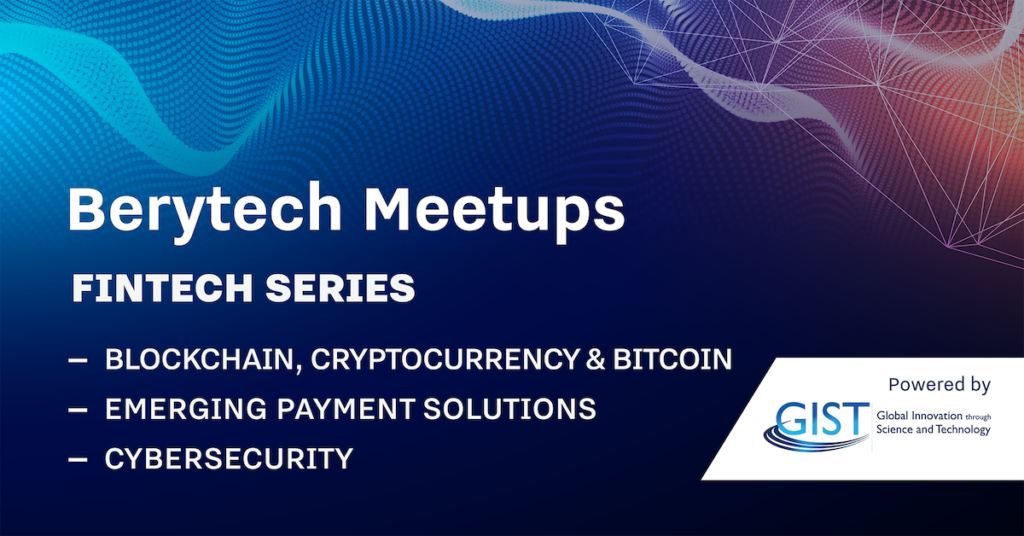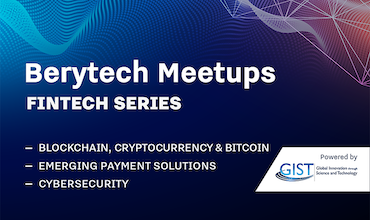
After 3 editions of the Berytech Meetups Artificial Intelligence series, Berytech dived into another 3 editions focusing this time on Fintech. This monthly event – aimed at building a network of entrepreneurs in Lebanon focusing on science and technology, concentrated its Fintech series on Blockchain, Emerging Payment Solutions and Cybersecurity. Read about the different interventions from professionals in the field.
Blockchain
The first meetup in the series covered Blockchain, Cryptocurrency and Bitcoin and hosted 4 different experts to discuss the technology, the implementation, the current challenges, the opportunities available, and the importance of building talent and growing this community.
Stephane Abichaker– a blockchain professional, brought forward his 18 years of experience in banking and finance in discussing two central questions about money: “How can you create rarity, as a money issuer/manager?” and “How to transact without trusting your counterparty?”. His first answer to these questions lied in Central Banking, which today derives its power from the obligation to use its currency imposed by law. Another new answer is Bitcoin, which uses a peer-to-peer, decentralized network allowing the free exchange of a mathematically rare electronic token. Abichaker explained how Bitcoin has been dubbed a Ponzi scheme, a polluting system and crime instrument. Yet, in reality, there is no bad publicity, and Bitcoin is spreading across the planet and in value because it solves the first two questions better than Central Banking.
Mark Ziade– founder and CEO at Helena, based his talk on how prediction markets leverage the wisdom of the crowd to predict the outcome of future events and milestones. He explained how prediction markets have many useful applications in the business world including forecasting, hedging and decision-making. Blockchain enables prediction markets to be more efficient by ensuring crowd diversity, independence and decentralization. He explained however that blockchain-based prediction market platforms have low adoption today for two main reasons: real-money predictions are highly regulated and blockchain user experience is not streamlined. His startup – Helena, was incubated at ConsenSys to try to solve the adoption problem by offering gamified prediction markets.
Amir Abdel Baki is the co-founder of BlocRecs, a blockchain-based platform that allows universities in Lebanon and the region to protect their certificates against fraud. His discussion covered the scarcity of blockchain developers in Lebanon highlighting plenty of online resources for self-learning. Because awareness about the technology is lacking, Abdel Baki as a member of BUIDL – a global blockchain community supported by ConsenSys, has been doing talks and workshops to better inform the public about blockchain: “Progress has been made. We are currently working with ESA Business School in Lebanon and the Center of Excellence for Information Assurance at King Saud University in Saudi Arabia. Because of the corruption Lebanon faces in almost every sector, it poses a great opportunity for blockchain startups. Blockchain can provide a viable solution for fraud whether it is in education, food safety, or financial transactions.”
Randa Al-Rifai is founder and organizer of the Bitcoin Blockchain Beirut Labs, a Blockchain and Cryptocurrency community in Lebanon. Their monthly meetup efforts to bridge the gap of education and awareness have materialized in an eclectic panel comprising academics, programmers, technology entrepreneurs, experienced financial consultants, and journalists. Al-Rifai explains, “As Lebanon is developing into a tech hub in the MENA region, we are confident that the Lebanese youth are the leaders of today and we need to unite our efforts to develop the Lebanese ecosystem, to increase employment rates, all of which will lead to the country’s stability and prosperity which requires fostering digital entrepreneurship. A Lebanese Association for Digital Transformation has been officially established to enhance the objective of promoting this initiative and it opened the doors for the public to learn and gain skills for futuristic prosperity through training, university courses, and workshops.”
Emerging Payment Solutions
The second edition of the Berytech Meetups Fintech series focused on Emerging Payment Technologies featuring speakers from the top players in the region: areeba, Visa, Halalah, and Startecheus.
Ramzi Saboury – Chief Commercial Officer of areeba, discussed how they are creating smarter, faster and seamless means of payment for banks, financial institutions, merchants, governments and individuals for them to take their businesses further. One of their nation-wide initiatives is ‘2bada Jadd’ launched in October 2018, in collaboration with Visa and Mastercard, with the aim of driving the whole economy to a cashless environment and educating both the merchants and the consumers in regions outside of the capital, where cash replacement using secure and convenient methods is less common, on the benefits of paying with cards and mobiles.
Payment innovations by areeba include a biometric card aiming at using the fingerprint recognition as a more convenient and secure alternative to PIN or signature to authenticate the cardholder during a transaction. Another innovation includes a dynamic QR mobile payment solution with Medco that allows customers to pay for gas with their smartphones and provides merchants with a fast, secure and convenient way to accept mobile payments.
Swipe2B is an innovative B2B payment tool which creates a digital connection between companies and suppliers, allowing them to settle their invoices via a paperless platform that is fast, secure and fully automated. Simplify empowers merchants with the necessary tools to create, launch and operate an e-commerce platform with many benefits such as time-to-market, security, and cost-effectiveness.
Hadi Raad – Vice President and Regional Head of Digital Solutions CEMEA at Visa ME, discussed three macro trends that are impacting markets globally: The unbundling of banks and payments ecosystems, the rise of Fintechs innovating locally to meet the emerging consumer digital needs, and the accelerated shift of commerce to digital form factors. “The payments experience is increasingly seamless and is vastly expanding,” explains Raad. “Contactless payment, which involves Tapping on POS (Point of Sales) machines, is increasingly becoming the default way of payment. Consumers can now tap their mobile with a Visa Token on a POS machine or even on another mobile POS device enabled for payments and certified through Visa. It is fast and secure and can enable digital payments acceptance to spread to smaller sellers.”
According to Raad, three trends are fueling the shift of commerce to digital:
- The rise of contextual commerce, where payments are increasingly meeting users in channels they are already using, like messaging apps, chatbots, social networks, or voice assistants such as Amazon Alexa or Google Home.
- The blurring boundaries between physical and digital worlds with experiences such as seamless car payments, such as Uber.
- The increasing trend toward ‘Set and forget’ commerce with packaged goods repositioned as lifetime services adopting subscription pricing models and payment credentials tokenized and stored on file with the merchant or gateway.
Maher Loubieh – Board Member and Director of Halalah, discussed the fintech/payment ecosystem and focused on the inter-connectivity of the sector and on the need for all stakeholders to be working together to achieve success. Stakeholders include but are not limited to banks, payment processors, international schemes, tech giants, telecom operators, retailers, suppliers, governments and of course users. He also focused on the importance of concentrating on pains within this ecosystem and connecting the dots to have a solid payment concept. “Halalah has progressed from being a digital wallet providing basic payment options to a neo-bank consolidating all payments options for its customers. It focuses on the importance of localizing the model to each market through understanding the dynamics, pains, and needs of such a market.”
Cybersecurity
The third and last edition of the Berytech Meetups Fintech series focused on cybersecurity: cyber threats, prevention methods and case studies.
Tony Feghali– CEO of Potech Consulting, discussed the steps to decrease cybercrime, the risks and the threats of hacking highlighting real case studies on major breaches, and the regulations that exist to protect individuals.
Hadi el Khoury– independent cybersecurity and GDPR advisor focused on the need to operate a linguistic shift from ‘cybersecurity’ to ‘Digital Risk Management’. “This will allow us to be more audible from decision-makers. We need to integrate “security” in the DevOps agile approach. This can be achieved through Hacker Stories(TM). For each User Story, we must be able to imagine one or more Hacker Stories(TM). This will allow a solid DevSecOps implementation. Hacker Stories(TM) must be Business Readable. We must make sure everyone in the organization understands them. To achieve this, we must stay away, as much as possible, from technical jargon and buzzwords.”
He continued, “We must invest more in Threat Intelligence and learn how to estimate, with a minimum of subjectivity, the probability of a Risk or a Hacker Story(TM). The Probability being exclusively related to the Threat, this could be achieved by asking ourselves those 4 questions: Does the threat “personae” exist? What’s the attacker’s motive? Does the attacker possess the right skillset? Does the attacker have the necessary resources?
We must train the younger generation on Digital Security. This is the most efficient “Security and Privacy by Design”. If you are French literate, here’s a Digital Security Playbook for children from the age of 7 and above, freely published by the France Chapter of the Information Systems Security Association (www.issa.org).”
Shawki Ahwash – a career banker and an anti-financial crime professional discussed different cybercrime risks facing financial institutions. The 5 top points he discussed are:
- Lebanon has lately enacted strict laws to criminalize cyberattacks leading to financial crimes.
- Training and awareness must be coupled with sound corporate governance culture for financial institutions to mitigate financial crime risk.
- IT security departments are key players in the fight against hacking attacks and in understanding the malign behaviors of hackers.
- The use of fraudulent or spearfishing emails is the most common method employed by hackers and fraudsters to siphon money outside the banks.
- “Money in the bank is like toothpaste in the tube. Easy to take out, hard to put back” – Earl Wilson. However, when an Enterprise Risk Management (ERM) is vigilantly applied, the potential loss can be avoided.

Berytech Meetups Powered By GIST: building a community around technology and innovation
The U.S. Department of State’s Global Innovation through Science and Technology (GIST) initiative empowers young innovators through networking, skills-building, mentoring, and access to financing to develop startup solutions that address economic and development challenges. Berytech has been awarded to create the GIST Innovation Hub in Lebanon thus joining a vibrant network of programs that nurture the next generation of entrepreneurs and innovators through direct, on-the-ground training.








